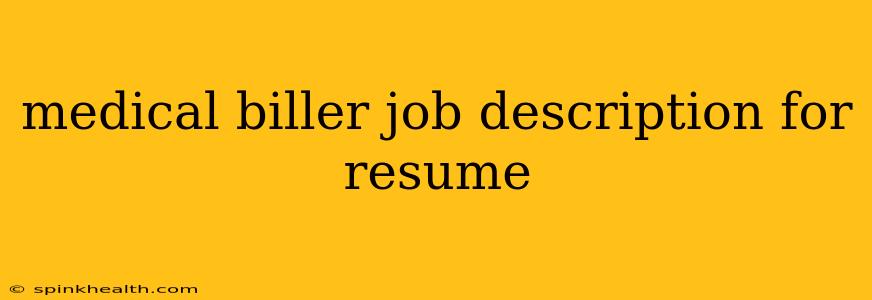Crafting the Perfect Medical Biller Job Description for Your Resume: A Story of Success
Landing that dream medical billing job requires more than just experience; it requires showcasing your skills in a way that resonates with potential employers. Your resume is your first impression, and a well-crafted job description is the key to unlocking opportunities. Think of it as telling a compelling story of your achievements and contributions in the field of medical billing. Let's craft that story together.
This isn't just about listing tasks; it's about demonstrating your impact. We'll move beyond simple statements like "Processed claims" and instead paint a picture of your expertise and results.
Instead of: Processed claims and ensured timely reimbursements.
Try: Streamlined the claims processing workflow, resulting in a 15% increase in timely reimbursements within six months, exceeding departmental targets.
See the difference? The second example quantifies your accomplishments and highlights your contribution to the company's bottom line. Let's delve deeper into the essential components of a compelling medical biller job description for your resume.
1. What are the Key Responsibilities of a Medical Biller?
This section sets the stage for your accomplishments. It's crucial to tailor this to the specific job you're applying for, but here are some common responsibilities you can adapt:
-
Claim Submissions and Follow-up: Don't just say you submitted claims. Describe your proficiency with various billing systems (e.g., EPIC, Cerner, etc.), your methods for ensuring accurate claim submissions (e.g., double-checking codes, verifying patient information), and your strategies for following up on denied claims. Did you identify and resolve specific issues that improved claim acceptance rates? Quantify your success whenever possible.
-
Coding and Billing Procedures: Highlight your knowledge of medical coding (CPT, ICD, HCPCS) and your understanding of billing regulations (e.g., HIPAA). Did you identify and correct coding errors that improved revenue? Did you train others in best practices? This showcases your expertise and dedication to accuracy.
-
Accounts Receivable Management: Detail your experience in managing outstanding claims, contacting insurance companies to resolve payment issues, and reducing accounts receivable days. Did you implement any new processes or strategies that improved collection rates? Did you successfully resolve complex billing disputes? Show, don't tell.
-
Data Entry and Maintenance: While seemingly basic, even data entry can be showcased effectively. Did you develop efficient data entry techniques that improved accuracy and speed? Did you implement any quality control measures?
2. How Can I Quantify My Achievements as a Medical Biller?
Numbers tell a powerful story. Employers want to see concrete evidence of your impact. Consider these examples:
- Increased revenue: "Increased revenue by X% by improving claim processing efficiency."
- Reduced accounts receivable: "Decreased accounts receivable days by X days through proactive claim follow-up."
- Improved claim acceptance rates: "Improved claim acceptance rates from X% to Y% by implementing a new quality control process."
- Reduced billing errors: "Reduced billing errors by X% by implementing a new training program for staff."
These quantifiable results demonstrate your value and effectiveness as a medical biller.
3. What Skills Should I Emphasize?
Beyond your experience, highlight relevant skills that make you a strong candidate. These might include:
- Proficiency in medical billing software: (Specify the software you've used)
- Medical coding expertise: (CPT, ICD, HCPCS)
- Knowledge of HIPAA regulations:
- Excellent communication skills: (Essential for interacting with insurance companies and patients)
- Problem-solving and analytical skills: (For resolving billing discrepancies and improving processes)
- Attention to detail: (Accuracy is paramount in medical billing)
- Organizational skills: (Managing large volumes of claims and patient information)
4. How to Structure Your Medical Biller Job Description
Use a clear and concise format. Start with a strong action verb, followed by a brief description of your responsibilities and accomplishments. Use bullet points for easy readability and quantify your achievements whenever possible.
Example:
Medical Biller | ABC Medical Clinic | 20XX-20XX
- Streamlined the claims processing workflow, resulting in a 15% increase in timely reimbursements within six months, exceeding departmental targets.
- Resolved over 100 denied claims monthly, identifying and correcting common coding errors to improve claim acceptance rates by 20%.
- Maintained accurate patient records and ensured HIPAA compliance, reducing the risk of audits and penalties.
- Proactively contacted insurance providers to resolve outstanding payments, reducing accounts receivable by 10%.
- Trained new billing staff in best practices, improving overall team efficiency and accuracy.
By crafting a compelling narrative using the strategies outlined above, you'll create a resume that not only showcases your skills but also highlights your value as a medical biller. Remember to tailor your job description to each specific job application, emphasizing the skills and experiences most relevant to the position. This personalized approach will significantly improve your chances of landing that dream job.

